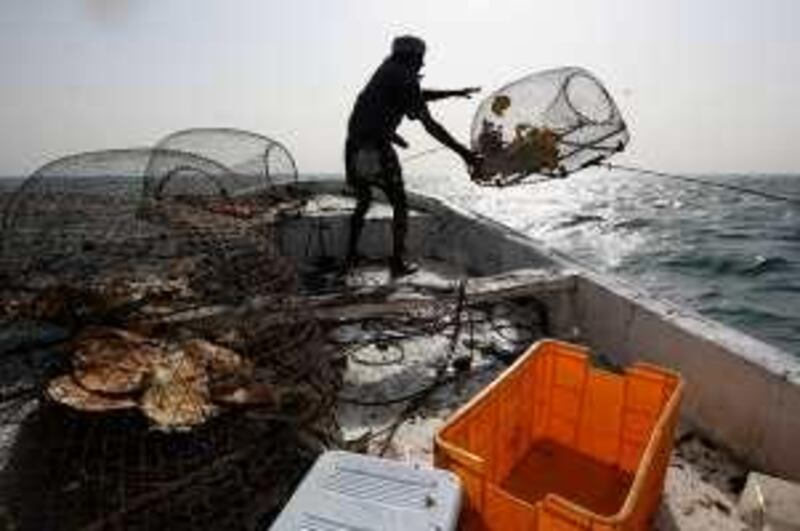ABU DHABI // Government ministries must work more closely with the fishing industry and update regulations to preserve the Gulf's fish stocks, a federal committee has found. The conclusion, to be published in a report this year, comes amid meetings between members of the Federal National Council's agriculture and fishery committee and fishermen's co-operative societies. Although overfished species - such as hammour, sha'ary, farsh and zuraydi - have been recovering in recent years, officials have pressed for the need to protect them against random fishing, which includes angling for baby fish.
The committee's chairman, Khaled al Falasi, yesterday urged the government ministries responsible for the fish industry to maintain close contact with the fishermen themselves and monitor common practices. The Government should not only enforce fishing limits, but educate fishermen about preservation. "Fishermen catch baby fish and throw it back in the water," he said. The sale of baby hammour is banned.
In the coming weeks, they will draft a report to address the issues at hand. Their recommendations could include extending the role of fisherman societies, responsible for selling the catch and distributing revenues, and providing subsidies to encourage more Emiratis to enter the fishing industry. The Ministry of Environment and the Ministry of Social Affairs oversee the fishing industry. Mr al Falasi said some laws were impractical and that the committee might suggest some changes. He said one rule that needed to be changed was the stipulation that at least one Emirati should be present in each fishing boat.
However, the committee member Khalifa bin Huweidin saw no problem with the rule and argued that instead, the Government should subsidise the industry to encourage Emiratis to work. He also suggested there should be some no-fishing zones. Mr al Falasi countered that it was important not to limit the number of fishing boats. "We need more practical regulations," he said. The current fishing law was passed in 1999, and fishermen and managers of the co-operative societies have complained that they were not consulted when the bill was drafted.
Recent figures suggest that about three-quarters of fish whose habitats are close to the ocean floor - including the hammour, which hide among rocks and crevices in coral reefs - are overfished, as are nearly half of other fish. Mr al Falasi said committee members were divided into groups, each of which was responsible for conducting visits in several emirates. "The idea is to find more about the fishermen's situation and understand their problems and also to see how we can preserve fish stock," Mr al Falasi said. "We've looked at the fishermen's situation and gathered valuable information which we will discuss in our meeting with the Ministry of Environment."
Mr al Falasi also said the role of fishermen societies had to be extended. He suggested that all fishermen be directly managed by these societies, which in turn would sell the catch and distribute revenues. "The society would show more responsibility for preserving fish stocks through using certain nets," he said. "Our old society, which was using primitive tools, has changed and our need for fish have increased. We need to develop the way fishermen think."
mhabboush@thenational.ae





